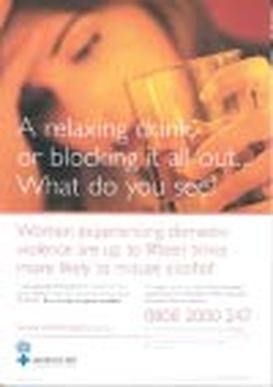
Women can experience domestic abuse in numerous ways. The experience can leave women with devastating, and at times, long lasting effects. Domestic abuse can leave women feeling some or all of the following:
· Loss of opportunity
· Isolation from family/friends
· loss of income or work
· Homelessness
· Emotional/psychological effects such as experiences of anxiety, depression or lowered sense of self-worth; poor health
· Physical injury or ongoing impairment
· If they are pregnant they may miscarry or the baby may be stillborn
· Time off work or study, and long-term impact on financial security and career
· Death (two women a week are killed by their partners or former partners)
(http://www.womensaid.org.uk/domestic-violence-articles.asp?section=00010001002200410001&itemid=1274)
Many women who experience domestic violence escape from their abusive partners, but some of these women have nowhere to go to and find themselves being homeless. Cramer and Carter (2002) found that the reason why most women were homeless was because they had run away from an abusive and violent relationship. (http://www.womensaid.org.uk/domestic-violence-articles.asp?section=00010001002200410001&itemid=1274)
Physical violence and abuse as well as non-physical abuse can have profound effects on the physical and mental health of women. Women who have experiences abuse are more likely to suffer from anxiety, depression, eating disorders and psychosomatic system (http://www.womensaid.org.uk/domestic-violence-articles.asp?section=00010001002200410001&itemid=1274).
Furthermore, according to the World Health Organisation (2002), violence can affect the reproductive health of women.
Women’s Aid states that one in four women is a sufferer of domestic violence at some point in her lifetime (Jones, 2006).
Each week, as stated by Women’s Aid, two women are murdered by their violent partners and even ex-partners as a result of domestic violence (Jones, 2006). In addition, 120 women are killed every year as a result of domestic violence. However these are only the reported cases of domestic violence.
Within the USA domestic abuse is a major health problem for women (Koop, 1989).
McLeer & Anwar (1989) found that younger women tend to be victims of battery. 30% of women in the emergency room were said to be there due to battery (Mcleer & Anwar, 1989), this suggests that these young women were battered so viciously that their injuries led to them being in hospital.

According to Heise et al (1994), victims of domestic abuse have their life expectancy reduced by five years.
Straus and Gelles (1987) found that women are three times more likely to have poor health and problems related to stress if they are in extremely violent or abusive relationships. Additionally they are likely to spend twice as much time in bed due to illness (Straus & Gelles, 1987) as a result of the domestic abuse.
For some women being domestically abused, they resort to alcohol abuse. Miller (1990) states that women in a violent relationship can be predicted strongly to suffer from an alcohol problem. Women’s Aid further supports this claim by stating that women who experience domestic violence and/or abuse are up to fifteen times more likely to misuse alcohol (Women’s Aid).
A logical explanation as to why women resort to the use of alcohol when being abused is that alcohol can be seen as a coping mechanism for the women. Women feel that the alcohol can help them cope with the abuse they are experiencing (Women’s Aid).
In addition to alcohol abuse as a result of domestic abuse, women also resort to drug abuse. They use drugs also as means of coping with their violent experiences (Women’s Aid) in order to numb themselves from the pain and help them cope. Women suffering from domestic abuse are up to nine times more likely to misuse drugs (Women’s Aid,).
There is much evidence according to Women’s Aid, (Women’s Aid) that many women are introduced to alcohol, drugs and other substances through their perpetrating partners in order to increase their control over the women. Such women will become dependent on the substances being provided to them which they will use to help them ‘cope’ with the abusive behaviour. So the perpetrator is causing more harm to the victim. First he is causing her physical harm and mental, psychological harm, but he is also additionally making her reliant on harmful substances. The perpetrator will become not only the abuser but also the supplier of the harmful substances that will cause the women to become reliant upon. Therefore this will make the victims more reliant on the perpetrator in order to continue receiving the substances, which will make leaving their violent partner a lot more difficult (Women’s Aid).
Substance abuse not only harms the individuals itself but it also has an impact on the society and community around the individual (The Stella Project, 2004).
Abbott and Williamson (1999) state that there are various other physical injuries women suffer from and these are:
There are many studies and pieces of research, as stated above, which have found that domestic abuse, whether it is physical and/or non-physical is highly affiliated with depression and stress. It can be suggested that the most detrimental consequence of domestic abuse is the instability of the mental state and mental ill health- such as anxiety, stress and depression.
· Being a victim to domestic violence can lead to both mental and physical health problems such as headaches, body ache and chronic illness. This is a result of taking stress onto the body by being victim to domestic violence. They may also experience anxiety attacks which would affect their social skills (Coker, Davis, Arais, Desai, Sanderson, Brandt & Smith, 2002).
Straus and Gelles (1987) found that women are three times more likely to have poor health and problems related to stress if they are in extremely violent or abusive relationships. Additionally they are likely to spend twice as much time in bed due to illness (Straus & Gelles, 1987) as a result of the domestic abuse.
For some women being domestically abused, they resort to alcohol abuse. Miller (1990) states that women in a violent relationship can be predicted strongly to suffer from an alcohol problem. Women’s Aid further supports this claim by stating that women who experience domestic violence and/or abuse are up to fifteen times more likely to misuse alcohol (Women’s Aid).
A logical explanation as to why women resort to the use of alcohol when being abused is that alcohol can be seen as a coping mechanism for the women. Women feel that the alcohol can help them cope with the abuse they are experiencing (Women’s Aid).
In addition to alcohol abuse as a result of domestic abuse, women also resort to drug abuse. They use drugs also as means of coping with their violent experiences (Women’s Aid) in order to numb themselves from the pain and help them cope. Women suffering from domestic abuse are up to nine times more likely to misuse drugs (Women’s Aid,).
There is much evidence according to Women’s Aid, (Women’s Aid) that many women are introduced to alcohol, drugs and other substances through their perpetrating partners in order to increase their control over the women. Such women will become dependent on the substances being provided to them which they will use to help them ‘cope’ with the abusive behaviour. So the perpetrator is causing more harm to the victim. First he is causing her physical harm and mental, psychological harm, but he is also additionally making her reliant on harmful substances. The perpetrator will become not only the abuser but also the supplier of the harmful substances that will cause the women to become reliant upon. Therefore this will make the victims more reliant on the perpetrator in order to continue receiving the substances, which will make leaving their violent partner a lot more difficult (Women’s Aid).
Substance abuse not only harms the individuals itself but it also has an impact on the society and community around the individual (The Stella Project, 2004).
Abbott and Williamson (1999) state that there are various other physical injuries women suffer from and these are:
- Burns,
- Scalds
- Bruises
- Concussion
- Broken bones
There are many studies and pieces of research, as stated above, which have found that domestic abuse, whether it is physical and/or non-physical is highly affiliated with depression and stress. It can be suggested that the most detrimental consequence of domestic abuse is the instability of the mental state and mental ill health- such as anxiety, stress and depression.
· Being a victim to domestic violence can lead to both mental and physical health problems such as headaches, body ache and chronic illness. This is a result of taking stress onto the body by being victim to domestic violence. They may also experience anxiety attacks which would affect their social skills (Coker, Davis, Arais, Desai, Sanderson, Brandt & Smith, 2002).